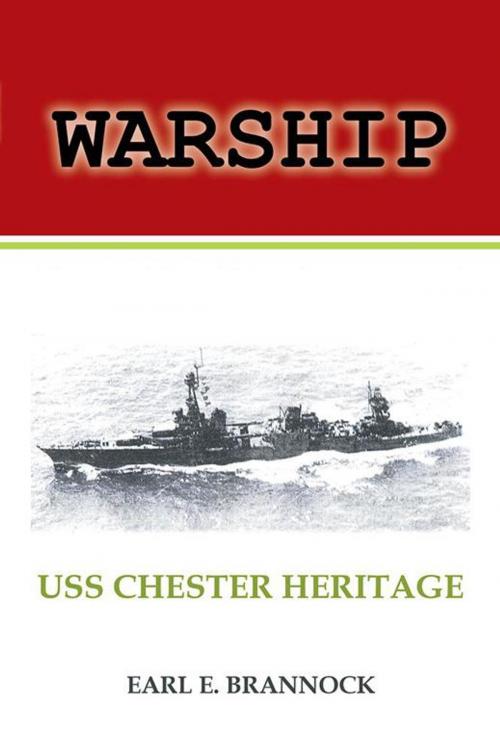| Author: | Earl E. Brannock | ISBN: | 9781493166572 |
| Publisher: | Xlibris US | Publication: | April 21, 2014 |
| Imprint: | Xlibris US | Language: | English |
| Author: | Earl E. Brannock |
| ISBN: | 9781493166572 |
| Publisher: | Xlibris US |
| Publication: | April 21, 2014 |
| Imprint: | Xlibris US |
| Language: | English |
Americans have been a seafaring people, since before the first Jamestown and Plymouth settlements, as British ships plied the Atlantic conducting coastal trade. It is no wonder then that, even when a small nation, the U. S. Navy proved itself a force to be reckoned with. This tradition continues, as the United States deploys the strongest naval forces in the world.
Over three centuries, thousands of American warships and their crews, manning both commissioned vessels and privateers, have helped defend liberty at home and fought for freedom abroad. This monograph describes three of those belligerents, all named CHESTER, all of which achieved sterling records of valiant service.
The first CHESTER, an armed galley, fought during the American Revolution, as part of the Continental Navy. Fittingly, it was sponsored by the Maryland Colony, a shipping powerhouse, even during the eighteenth century, and named after its construction location, Chestertown, Maryland. Author Brannock also hails from Maryland and a seafaring heritage.
Another CHESTER, a light cruiser, did not emerge until just prior to World War I. It was also named after its mid-Atlantic shipbuilding town, Chester, Pennsylvania. Its crews served in the Great War, mostly on convoy duty, during the submarine warfare engaged in with German U-boats.
The third USS CHESTER (CA-27), also a light cruiser, was commissioned in 1930, and also named after Chester, Pennsylvania. Brannocks account of the duties it performed during the interwar years provides a unique portrayal of life as a U. S. Navy sailor at that time. Political upheavals in nations where American citizens and interests had to be protected were prevalent in Central America, and diplomatic and military missions were carried out, while an arms race engulfed Europe. Moreover, during the glamorous 1930s, millions traveled on ocean-going liners and so naval vessels were greeted in foreign ports by enthusiastic crowds and celebrations. CHESTER crews were feted on two continents.
Yet as the decade went on, war clouds darkened, world-wide. By 1941, the United States was in a quasi-war with Germany on the Atlantic Ocean, and Americans in Asia were threatened by Japanese occupation. USS CHESTER steamed into Pearl Harbor naval base in the early afternoon of December 7, 1941, missing the brunt of the early morning Japanese bombings, due to delays caused by a storm at sea.
From that day on, CHESTER was active in nearly every major engagement in the Pacific Theater, during World War II. Legendary officers like William Bull Halsey commanded CHESTERs units. Adm. Arleigh Burke served on CHESTER.
By 1943, author Brannock had joined the crew as a young enlisted sailor, but one who had logged many hours underway, while serving in the Maryland State Fishery Force. Thus, as a quartermaster on CHESTERs bridge, Brannock had a gulls eye view of the battles. His perspective was enhanced by the fact that CHESTER often served as flagship for Cruiser Division 5 and various task forces to which it was temporarily assigned.
For these obvious reasons, the account of USS CHESTERs World War II service comprises the bulk of this book. Because Brannock personally collected the ships archives and memoirs, the work offers an unequaled, first-hand and official rendition of the war service of one ship, its officers, and crew. Although thousands of books have been written on World War II, most cover broader subject matter; so small technical and tactical details can be lost. But readers miss little with this tract.
So sail along on a riveting ride across two centuries, two oceans, and four continents in this spirited tale of life, duty, and combat on board three American warships, all named CHESTER.
Americans have been a seafaring people, since before the first Jamestown and Plymouth settlements, as British ships plied the Atlantic conducting coastal trade. It is no wonder then that, even when a small nation, the U. S. Navy proved itself a force to be reckoned with. This tradition continues, as the United States deploys the strongest naval forces in the world.
Over three centuries, thousands of American warships and their crews, manning both commissioned vessels and privateers, have helped defend liberty at home and fought for freedom abroad. This monograph describes three of those belligerents, all named CHESTER, all of which achieved sterling records of valiant service.
The first CHESTER, an armed galley, fought during the American Revolution, as part of the Continental Navy. Fittingly, it was sponsored by the Maryland Colony, a shipping powerhouse, even during the eighteenth century, and named after its construction location, Chestertown, Maryland. Author Brannock also hails from Maryland and a seafaring heritage.
Another CHESTER, a light cruiser, did not emerge until just prior to World War I. It was also named after its mid-Atlantic shipbuilding town, Chester, Pennsylvania. Its crews served in the Great War, mostly on convoy duty, during the submarine warfare engaged in with German U-boats.
The third USS CHESTER (CA-27), also a light cruiser, was commissioned in 1930, and also named after Chester, Pennsylvania. Brannocks account of the duties it performed during the interwar years provides a unique portrayal of life as a U. S. Navy sailor at that time. Political upheavals in nations where American citizens and interests had to be protected were prevalent in Central America, and diplomatic and military missions were carried out, while an arms race engulfed Europe. Moreover, during the glamorous 1930s, millions traveled on ocean-going liners and so naval vessels were greeted in foreign ports by enthusiastic crowds and celebrations. CHESTER crews were feted on two continents.
Yet as the decade went on, war clouds darkened, world-wide. By 1941, the United States was in a quasi-war with Germany on the Atlantic Ocean, and Americans in Asia were threatened by Japanese occupation. USS CHESTER steamed into Pearl Harbor naval base in the early afternoon of December 7, 1941, missing the brunt of the early morning Japanese bombings, due to delays caused by a storm at sea.
From that day on, CHESTER was active in nearly every major engagement in the Pacific Theater, during World War II. Legendary officers like William Bull Halsey commanded CHESTERs units. Adm. Arleigh Burke served on CHESTER.
By 1943, author Brannock had joined the crew as a young enlisted sailor, but one who had logged many hours underway, while serving in the Maryland State Fishery Force. Thus, as a quartermaster on CHESTERs bridge, Brannock had a gulls eye view of the battles. His perspective was enhanced by the fact that CHESTER often served as flagship for Cruiser Division 5 and various task forces to which it was temporarily assigned.
For these obvious reasons, the account of USS CHESTERs World War II service comprises the bulk of this book. Because Brannock personally collected the ships archives and memoirs, the work offers an unequaled, first-hand and official rendition of the war service of one ship, its officers, and crew. Although thousands of books have been written on World War II, most cover broader subject matter; so small technical and tactical details can be lost. But readers miss little with this tract.
So sail along on a riveting ride across two centuries, two oceans, and four continents in this spirited tale of life, duty, and combat on board three American warships, all named CHESTER.















